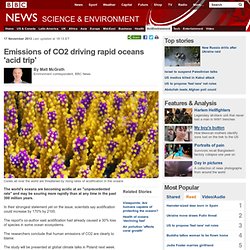

Democracy Now! at the UN Climate Summits. Warsaw Climate Summit 2013. Global Forest Change. Arctic storms speed up release of methane plumes - environment - 24 November 2013. A stormier Arctic could fast-track the greenhouse gas into the atmosphere, potentially accelerating global warming.

Super typhoon Haiyan is climate wake-up call. It seems these days that whenever Mother Nature wants to send an urgent message to humankind, it sends it via the Philippines.

This year the messenger was Haiyan, known in the Philippines as Yolanda. Yolanda: the Messenger. Arctic Seafloor Releasing 17 Teragrams of Methane Every Year, Study Finds. Nov 26, 2013 04:14 AM EST.

Le Sénat discute d'une loi visant à limiter la liberté des semences. La Confédératiion paysanne occupe ce soir mardi 21 janvier les locaux du GNIS (Groupement national interprofessionnel des semences).

Le syndicat entend protester contre une loi en discussion au Parlement. Cette proposition de loi "sur la contrefaçon", vise à contrôler davantage la liberté de semer. Si vous faites du jardinage, il vous est sans doute déjà arrivé de conserver les graines produites par vos fleurs pour ensuite les ressemer l’année suivante. C’est ce que font encore beaucoup d’agriculteurs : on appelle cela les "semences de ferme". Canada reveals climate stance with praise for Australian carbon tax repeal - 14 Nov 2013. Canada has dropped any remaining pretences of supporting global action on climate change by urging other countries to follow Australia's example in gutting its climate plan.
In a formal statement, the Canadian government said it "applauds" the move by Australia this week to repeal a carbon tax on the country's 300 biggest polluters. "Canada applauds the decision by prime minister Abbott to introduce legislation to repeal Australia's carbon tax. The Australian prime minister's decision will be noticed around the world and sends an important message," the formal statement from Paul Calandra, parliamentary secretary to Canada's prime minister, Stephen Harper, said. The Harper government withdrew from the Kyoto protocol on climate change in 2011 and Canada has failed to meet its own international emissions to cut greenhouse gas emissions - almost entirely because of its mining of the carbon-heavy Alberta tar sands.
Emissions of Methane in U.S. Exceed Estimates, Study Finds. The analysis also said that methane discharges in Texas and Oklahoma, where oil and gas production was concentrated at the time, were 2.7 times greater than conventional estimates.

Emissions from oil and gas activity alone could be five times greater than the prevailing estimate, the report said. The study relies on nearly 12,700 measurements of atmospheric methane in 2007 and 2008. Its conclusions are sharply at odds with the two most comprehensive estimates of methane emissions, by the Environmental Protection Agency and an alliance of the Netherlands and the European Commission. Brazil says Amazon deforestation rose 28% in a year. Emissions of CO2 driving rapid oceans 'acid trip' 17 November 2013Last updated at 18:13 ET By Matt McGrath Environment correspondent, BBC News Corals all over the world are threatened by rising rates of acidification in the oceans The world's oceans are becoming acidic at an "unprecedented rate" and may be souring more rapidly than at any time in the past 300 million years.

In their strongest statement yet on the issue, scientists say acidification could increase by 170% by 2100. Warsaw climate talks: the world's poorest cannot wait for a 2015 deal. We are now at a tipping point that threatens to flip the world into a full blown climate emergency.

As the poorest and most vulnerable people of the world endure the increasingly damaging impacts of a warming world, tired excuses and calls to delay action are no longer acceptable. Economics aside, this is a moral and ethical challenge of the highest order. If ministers leave the UN climate talks in Warsaw this week without a clearly defined roadmap to accelerate the transition to a low-carbon world economy, our window of opportunity will become smaller yet again. Just six months ago, the world entered a new danger zone when concentrations of carbon dioxide in the atmosphere passed 400 parts per million for the first time in recorded history.
De nouvelles découvertes accentuent la pression sur la conférence de Varsovie. Les sécheresses récurrentes ont obligé certains membres de la communauté Wodaabe de Diffa, dans le sud-est du Niger, à abandonner le nomadisme et donc une partie de leur identité JOHANNESBOURG, 11 novembre 2013 (IRIN) - Selon une nouvelle série d’études, les facteurs de stress climatique comme les sécheresses et inondations récurrentes portent d’ores et déjà atteinte aux moyens de subsistance de certaines populations, affaiblissant leur capacité à s’adapter ou à améliorer leur vie.

Les auteurs ont exhorté les négociateurs qui se réuniront à Varsovie le 11 novembre, conformément à la Convention-cadre des Nations Unies sur les changements climatiques (CCNUCC), de redoubler d’efforts pour atténuer les effets du changement climatique. Ils ont également préconisé la constitution d’une « structure institutionnelle » dans le cadre de la CCNUCC pour les « pertes et dommages » causés par le changement climatique. Catastrophes naturelles : la facture des dommages a quadruplé en 30 ans. Brésil : nouvelle accélération de la déforestation de l'Amazonie.
Au Brésil, la déforestation de l'Amazonie a atteint 5 843 km2 sur un an, en hausse de 28 % par rapport à l'année précédente, a annoncé jeudi 14 novembre la ministre de l'environnement du pays, Izabella Teixeira.

Leaked IPCC report must be catalyst for a reassessment of global food system. In case it wasn't already clear, there is now consensus that climate change will have a significant impact on the world's food systems.

A leaked draft of the newest report from the United Nations Intergovernmental Panel on Climate Change (IPCC) underscored the serious threat climate change poses for meeting demand for food in the coming decades. The contents of the report – though not a revelation – should be a catalyst for a complete reassessment of the global food system. Increasingly, it is not a question of if or when a changing climate will impact our food, but rather how farms and agricultural systems will choose to adapt. In a warming world there will be bursts of heavy rain and prolonged drought that will, as the UN puts it, exacerbate water shortages and shift growing seasons. Mass Walk-Out at UN Climate Talks Protests Lack of Progress. By Paul Brown It is first time in 19 years of tortuous annual negotiations over targets and timetables for saving the Earth’s climate from overheating that the non-governmental organizations have felt sufficiently frustrated to take such a step. Many of the 800 people involved are members of national delegations and are an important part of pushing the negotiations to a successful conclusion.
The groups concerned, some of them—like ActionAid, Oxfam and World Wildlife Fund—normally considered moderate, issued a joint statement saying that the climate talks here were set to “achieve virtually nothing.” Enough is Enough The statement said: Japan slashes climate reduction target amid nuclear shutdown. Climat : la conférence de la dernière chance. Australia is on track for its warmest ever year, says study.
Australia is "on track" for its warmest ever calendar year, temperatures in October 1.43C above the long-term average and more than 100 heat-related records broken in the past 12 months, according to a new report. The Climate Council study, called Off the Charts, says that the country has just had its warmest ever 12-month period, from 1 November 2012 to 31 October 2013.
This is the third month in a row that this 12-month temperature record has been broken. The report, drawn from Bureau of Meteorology data, states that the past 12 months have been, on average, 0.22C warmer than any other equivalent period prior to 2013, making it likely that 2013 will be Australia's warmest ever calendar year. Typhon aux Philippines: probablement des centaines de morts - 09/11. Climate Impacts Poised to Decimate Human and Earth Systems, says Leaked IPCC Draft. The leaked draft paints a bleak vision of the world if mitigation efforts are not dramatically increased and emission reduction targets met. (Photo: Shutterstock)A draft of a global scientific review on how human and natural systems are expected to respond to the growing threat of climate change has been leaked and its contents—though not wholly unexpected to those who have followed climate science news in recent years—are nonetheless both alarming and devastating. Titled, Climate Change 2014: Impacts, Adaptation, and Vulnerability, the leaked document is the draft version of the second installment of the Intergovernmental Panel on Climate Change's latest review of the global scientific consensus on the global warming and climate change.
The IPCC's first installment, released in September, focused on assessing the global scientific community's combined research on the causes, pace, and evidence of planetary climate change. Coalition turns back on UN climate summit. Parliament trumps climate talks. How Science Is Telling Us All To Revolt. Waste land: large-scale irrigation strips nutrients from the soil, scars the landscape and could alter climactic conditions beyond repair. Image: Edward Burtynsky, courtesy Nicholas Metivier Gallery, Toronto/ Flowers, London, Pivot Irrigation #11 High Plains, Texas Panhandle, USA (2011) In December 2012, a pink-haired complex systems researcher named Brad Werner made his way through the throng of 24,000 earth and space scientists at the Fall Meeting of the American Geophysical Union, held annually in San Francisco.
This year’s conference had some big-name participants, from Ed Stone of Nasa’s Voyager project, explaining a new milestone on the path to interstellar space, to the film-maker James Cameron, discussing his adventures in deep-sea submersibles. But it was Werner’s own session that was attracting much of the buzz. La Russie et la Chine refusent de mieux protéger l'Antarctique. Le nouveau round de négociations sur la création de sanctuaires marins en Antarctique, qui s'est achevé, vendredi 1er novembre, en Australie, s'est encore conclu par un échec.